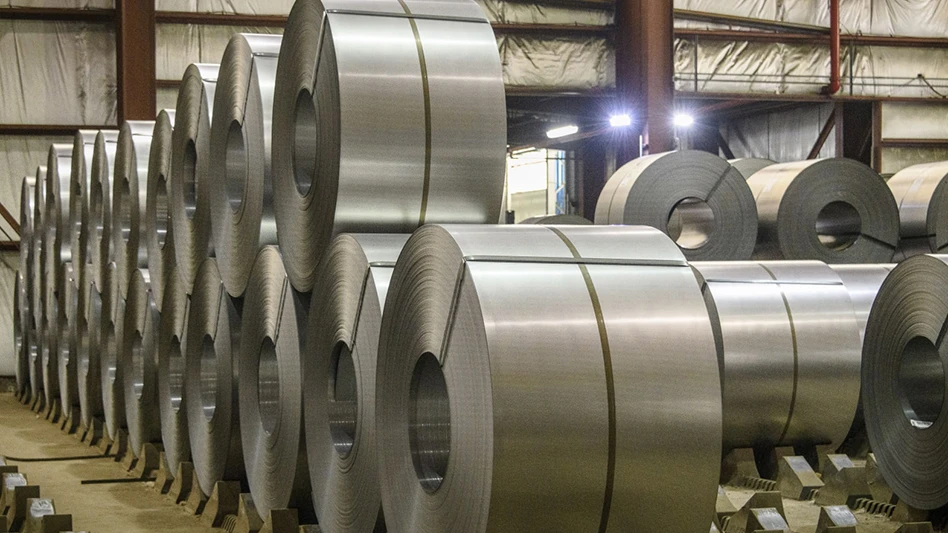In 1983, when a scrap metal processor and a former newspaper editor-turned-surplus dealer decided there were opportunities in buying usable stainless steel from scrap processors and selling it to manufacturers, Atlantic Stainless Co. Inc., North Attleboro, Mass., was born. Today, the company employs 25 people and has an inventory of 5 million pounds of usable stainless, which has been turned over many times, according to Gerald Cohen, president.
The two partners’ skills were a perfect complement for the business, says William Gouveia, vice president. "Gerry had some experience in the scrap business – and he had a heavy surplus background from his family’s business – and my experience was in dealing in and marketing usables, so it really worked well for us to get together."
Surplus materials, also called usables, are primary materials no longer needed by a particular manufacturer, but that are too good to be scrapped. Such materials often can command a higher price – with minimal processing – when purchased by a firm such as Atlantic Stainless than they would if they were sold as scrap.
"Every scrap dealer has material in his yard that’s really too good to be scrapped, only a lot of them don’t realize it," says Gouveia. "It became our mission in life to educate scrap dealers that the material they were cutting up would be worth more without them doing anything to it, to us. You could think of it as the ultimate upgrade."
Usables could be generated, for example, by a company manufacturing hospital carts using stainless steel sheet and tubing. If for some reason the company’s market dries up for hospital carts, they might still have supplies of the raw material but no use for it.
"Their choice is to scrap the material, or hold it indefinitely," says Cohen. "When they scrap it, a scrap dealer purchases the material. His job is to market the material in terms of scrap. What we’re telling the scrap dealers is they don’t have to prepare this material – they don’t have to put time and effort into it. We’ll come in and buy it, we’ll pay the trucking, and we’ll purchase the material without them needing to put any preparation onto it, and pay them more than they could get if they sold it as scrap."
A WONDERFUL METAL
Atlantic Stainless, which recently moved to a larger facility in the same city, deals in usable and sometimes primary high-temperature alloys, stainless steel and titanium.
"We picked these materials because it’s what we know best, and there is a market for those items," says Cohen. "There’s less risk in terms of long-term effect of weather, particularly. Steel rusts, aluminum corrodes, but not stainless steel."
Gouveia is equally enthusiastic about their metal of choice. "Stainless is a wonderful metal to work with, in terms of selling, because you can take a big stainless bar and set it down outside for a month of two, and nothing happens to it. It doesn’t diminish in value and it doesn’t rust over."
Stainless steel is used in a number of applications, including hospital equipment, chemical equipment, food equipment, and medical equipment, he adds.
The company deals in some new material along with the surplus stainless, but stops short at dealing in obsolete scrap, leaving that to scrap processors, says Cohen. But the company has to do some sorting and processing, as the material tends to come in odd lots.
"We sort through and pick out what’s scrap out of the material and sell the new material to manufacturers," he says. They can store small lots of a particular grade of stainless until it accumulates enough to sell to a manufacturer.
"Some people say you can’t handle usables and prime material, but we’ve proven that’s not true," says Gouveia. "I think it’s very rare, because you have to have a tremendous combination of experience and knowledge to do that and be able to get away with it. We’ve been successful, in part, because our motto has always been ‘never get beyond your capabilities.’"
Atlantic Stainless buys and sells material in a wide geographic region, consisting of the entire U.S. plus Canada and Mexico. Also, the company sells a small amount of material into Europe.
TESTING METALS
The company does extensive material sorting into grades, as well as saw cutting, shear cutting and plasma cutting metals.
"We’re capable in house of cutting 3-inch thick stainless up to 8 feet wide and 20 feet long," says Cohen. "We can cut round bar up to 16 inches."
Atlantic Stainless has stayed up to date in testing equipment through the years, through necessity. One way the company tests stainless steel is with a spectrographic analyzer, an expensive but worthwhile investment, says Gouveia. "When we tell a customer that a piece of metal is type 304, we have to know beyond all shadow of a doubt, that that’s what it is."
The company also uses outside testing labs when they need to know the material’s full chemical and physical properties, adds Cohen.
Atlantic Stainless’ product occupies a niche in between primary metal and scrap. It sells below the primary price, which is what enables it to compete, according to Gouveia. "That’s our niche to people on the consuming end – we’re offering them good quality material at below market prices."
In that niche, Atlantic has to establish relationships with both scrap dealers and manufacturers. "We must have the confidence of our customers that we know how to handle metal properly," says Gouveia. "We stand 100 percent behind every piece of metal that leaves our plant, and if anything goes wrong, we make good on it. We’ve had surprisingly few problems over the years. If there’s the slightest doubt in our minds about whether this material is good or not, we don’t use it."
UNIQUE NICHE
Although there are other companies in the industry that deal in usable materials, none do exactly what Atlantic Stainless does, says Cohen. "I would say we are the largest in the United States and probably the world," he says.
It’s hard to put an exact number on how many scrap dealers are dealing in surplus material, according to Gouveia, but he says it’s "not nearly enough," though the number seems to be increasing. "If it is, we’re doing our job," says Cohen. But unfortunately, too many scrap processors are not yet tapped into a surplus system.
In order to spread the word about the market opportunity they offer, Cohen and Gouveia have tried a number of methods, including conducting seminars at venues such as the Institute of Scrap Recycling Industries’ annual convention and advertising. Although the attendance for the seminars was always good, and so was the feedback, "there are a lot of scrap dealers out there, and some of them don’t know about us, and some of them have forgotten us," says Cohen.
ODD COUPLE
Cohen, whose family was in the surplus business in New York, handling all sorts of materials, bought into and eventually owned a full-service scrap processing yard which dealt in both ferrous and nonferrous metals. He kept the yard open for a while after starting Atlantic Stainless with Gouveia, but ended up liquidating the yard when the new business in usables became more profitable.
Gouveia, who started his career as the associate editor for a small weekly newspaper in his home town, "made the very logical jump from the newspaper business to the surplus stainless business." He worked for a surplus stainless operation for five years, during which time he actually bought some usable stainless from Cohen’s scrap yard.
"When I left that company, Gerry contacted me and suggested we sit down together and discuss starting a business," he explains. The combination of skills and personalities has clearly been a success. Making a reference to the old television show, "The Odd Couple," Gouveia describes Cohen as the "Felix" type – highly organized and meticulous – and himself as the "Oscar" type – outgoing but less organized.
"Gerry’s desk is neat and organized, and he can put his hands on anything in five minutes, or five seconds," he says. "My desk is not quite as neat and organized, but if you give me a week I can find almost anything. Some days I drive him crazy or he drives me crazy, but we always go home laughing and having a good time."
The company has grown significantly, from its humble beginnings of Gouveia "in an office with a telephone and a pickup truck," while Cohen still had his scrap yard. "We just started in a small way and it kind of took off on us," says Gouveia. "We are fiercely proud of our business and what we have accomplished. There’s not a day goes by that I don’t walk in the office and look around and feel a little surprised and awed and very proud at what we’ve managed to do."
GOLDEN RULE
Atlantic Stainless operates under the Golden Rule, says Gouveia. "We treat everybody who comes to us with the same amount of respect and deference. Everybody in this business is important. If you treat someone like a 500,000-pound sale when you buy 50 pounds, he’s going to remember you when that 500,000- pound sale comes up."
In addition, because it’s hard enough to convince scrap processors to sell usable stainless as it is, surplus dealers such as Atlantic Stainless have to be especially sensitive to the pressures scrap dealers face.
"If you keep coming back to scrap dealers with problems, or you can’t take it all, or things like that, scrap dealers can’t be bothered with you," he says. "Gerry’s background in scrap has really enabled us to understand the problems that scrap dealers have, the way they think and the way they need to operate their business, and we’ve built our business around that. Scrap dealers are important to us – they’re what keep us going – so if we can make their life easier and make them happy and make them more money, that’s the key to our success."
But Atlantic Stainless also has to understand the markets it sells usables into. As a result, there are certain rules the company must follow. For one, the company takes any risks associated with handling the material. Also, Atlantic Stainless has expensive testing equipment, knows its markets, and never tries to misrepresent materials.
"That’s the key to handling usable materials – don’t take a sow’s ear and try to sell it as a silk purse," says Gouveia. "It doesn’t work."
Although they are proud of their accomplishments to date, and plan to maintain them, says Cohen, it is an ongoing challenge to locate usable stainless and educate scrap processors about the services Atlantic Stainless provides.
"I’m sure there’s a vast number of scrap processors who have usable stainless sitting in their yards right now who could make a lot of money selling it to us," says Gouveia. "We haven’t done our job yet because we haven’t found them."
In addition, the company is going to tap more into usable high-temperature alloys, says Cohen. "There’s a market there that we haven’t touched. But most of all, our goal is to absolutely saturate the scrap processors in the United States and elsewhere, and make them all aware of the value of selling usables to us."
The author is editor of
Recycling Today.
Explore the August 2001 Issue
Check out more from this issue and find your next story to read.
Latest from Recycling Today
- Magnomer joins Canada Plastics Pact
- Electra names new CFO
- WM of Pennsylvania awarded RNG vehicle funding
- Nucor receives West Virginia funding assist
- Ferrous market ends 2024 in familiar rut
- Aqua Metals secures $1.5M loan, reports operational strides
- AF&PA urges veto of NY bill
- Aluminum Association includes recycling among 2025 policy priorities





